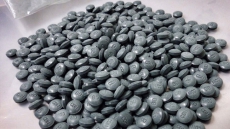With the holiday season in full swing, Indians are flocking to the online marketplace in droves. But there’s one unusual item flying off the virtual shelves: Online retailers say cow dung patties are selling like hot cakes.
The patties — cow poop mixed with hay and dried in the sun, made mainly by women in rural areas and used to fuel fires — have long been available in India’s villages. But online retailers including Amazon and eBay are now reaching out to the country’s ever-increasing urban population.
Some retailers say they’re offering discounts for large orders. Some customers are asking for gift wrapping.
“Cow dung cakes have been listed by multiple sellers on our platform since October and we have received several customer orders” since then, said Madhavi Kochar, an Amazon India spokeswoman.
The orders come mostly from cities where it would be difficult to buy dung cakes, she said.
In India, where Hindus have long worshipped cows as sacred, cow dung cakes have been used for centuries for fires, whether for heating, cooking or Hindu rituals. Across rural India, piles of drying cow dung are ubiquitous.
Radhika Agarwal of ShopClues, a major online retailer in India, said demand for the cow dung cakes spiked during the recent Diwali season, a time when Hindus conduct prayer ceremonies at their homes, factories and offices. On a recent day, ShopClues’ website showed that the patties had sold out.
“Around Diwali, when people do a lot of pujas in their homes and workplaces, there is a lot of demand for cow dung cakes,” said Agarwal, referring to rituals performed during the popular festival.
“Increasingly, in the cold weather, people are keeping themselves warm by lighting fires” using them, she said, adding that people who grew up in rural areas find the peaty smell of dung fires pleasant.
“It reminds them of the old days,” she said.
The cakes are sold in packages that contain two to eight pieces weighing 200 grams (7 ounces) each. Prices range from 100 to 400 rupees.
Dung cakes are also used as organic manure, and some sellers are marketing them for use in kitchen gardens.




